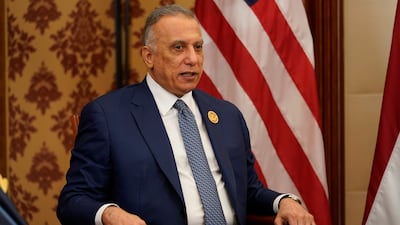A rift is widening among Iran-backed political groups in Iraq over how to deal with the Shiite cleric Moqtada Al Sadr's demands before a crucial meeting to solve months of political deadlock over forming a new government.
Mr Al Sadr withdrew his movement from national politics after an increasingly bitter row with the Co-ordination Framework, a coalition of mainly Iran-backed parties which suffered major losses in elections a year ago.
He now wants parliament to be dissolved and has suggested keeping caretaker Prime Minster Mustafa Al Kadhimi and President Barham Salih in office to oversee a second round of early elections.
The row over government formation has led to mass protests and armed clashes. Mr Al Sadr won the most votes in the election, but not enough for an absolute majority.
Almost a year has elapsed and the country has failed to form a new government due to rival factions. Although the Sadrists secured 73 seats in the 329-seat chamber, they have failed to form a majority government with Sunnis and Kurds.
Mr Al Sadr has sought to sideline rivals who have pushed for a consensus government in which they would gain or retain control of ministries.
Frustrated over the failure to turn election gains into government formation, Mr Al Sadr has been sending shock waves through Iraq's political scene since June.
He ordered his followers to resign from parliament and endorsed a weeks-long sit-in and protests inside and outside the parliament to derail Co-ordination Framework efforts to hold a session.
Fears of new civil war
Bloody street battles erupted late last month between Mr Al Sadr’s militias and Tehran-allied groups inside in Baghdad — at one point dragging in regular security forces directly under government control. Serious violence was also reported in the country's south, with political and militia offices attacked by gunfire and a number of people reported killed in clashes.
The nearly 24-hour crisis left at least 30 dead and hundreds wounded, leading to fears Iraq was sliding into a new civil war.
The last national poll was held early following demands by a national protest movement that was met with extreme violence from security forces, leading to the resignation of former prime minister Adil Abdul Mahdi's government.
Analysts say yet another election would further dent public faith in national politics.
Three politicians who requested anonymity told The National on Tuesday that Co-ordination Framework leaders had failed to reach an agreement on Saturday on how to meet Mr Al Sadr’s demands ahead of a meeting with him planned for this month.
The politicians said senior Co-ordination Framework leader Hadi Al Amiri and former prime minister Haider Al Abadi, and a few others, are pushing to replace the coalition's candidate for prime minister, Mohammed Shia Al Sudani, who Mr Al Sadr rejected.
They are suggesting either keeping Mr Al Kadhimi in post as Mr Al Sadr wishes, or to back National Security Adviser Qassim Al Araji, the politicians added.
That suggestion has been strongly rejected by former prime minster Nouri Al Maliki and Qais Al Khazaali, leader of the influential armed group Asaib Ahl Al Haq, they said. Both are seen as Mr Al Sadr's main rivals.
“That camp is looking for solutions to get out while the other one still wants to provoke Al Sadr even if it leads to confrontations again with him,” one politician who attended Saturday's meeting said.
“We saw how stubbornness threw us into a chaos and how blood was shed in the streets,” he added.
“That doesn't mean that this camp supports Al Kadhimi as a person, but it is one of the ways to offer solutions to ease the tension,” another said.
Moqtada Al Sadr announces resignation - in pictures
In a statement issued on Monday, Mr Al Abadi’s Nasr Alliance defended his efforts to end the stalemate.
“Regardless of the name of candidate to the prime minister post, Al Abadi’s initiatives always stress on considering the correct path to solve the crisis and the most important thing is that all political parties must agree on a road map to end the political deadlock,” the statement said.
It called for a “constitutional and political settlement to pave the way for early elections in order to restore the legitimacy of the political process.”
On Monday, the spokesman of Asaib Ahl Al Haq's Sadiqoon bloc in parliament, Mahmoud Al Rubaie, wrote on Twitter: “No, no, no for the renewal” to Mr Al Kadhimi.
Before heading to New York to take part in the high-level debate of the 77th session of the UN General Assembly, Mr Al Kadhimi touted his government achievements in “establishing the best relations with our neighbours and the international community”.
“We have boosted co-operation and partnership with everyone which will reflect positively on the interests of our people at all levels,” he said in a statement late on Monday.
He described the political stalemate as a “critical,” but that the doors for a solution were wide open, with “calm and sincere dialogue” needed that puts “the interest of Iraq and its people above all.”
October's early election was the fifth parliamentary vote for a full-term government since the US-led invasion in 2003 that toppled Saddam Hussein.
The continuing crisis is the longest the country has experienced since then, jeopardising stability and raising the possibility of civil war flaring up in a nation still recovering from decades of conflict.
































